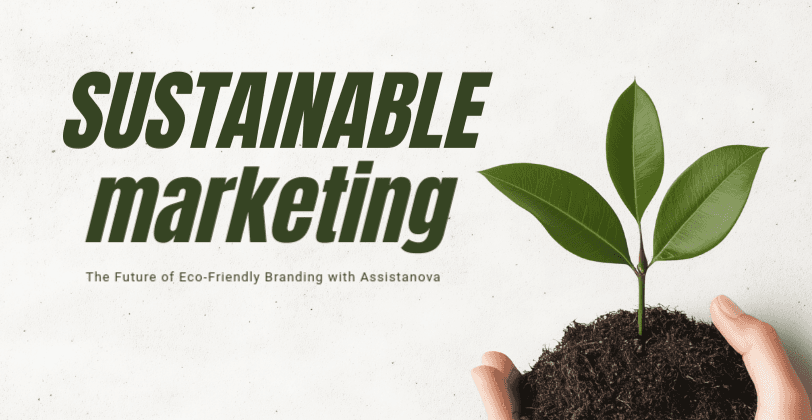What is Sustainable Marketing?
Sustainable marketing is more than just a buzzword—it's a business approach that prioritizes long-term environmental, social, and economic benefits over short-term profits. It focuses on creating and promoting products or services that have minimal negative impact on the environment while meeting the needs of consumers. As the world grapples with climate change and increasing environmental concerns, sustainable marketing has emerged as a way for companies to stay competitive, build brand loyalty, and contribute to a greener planet.
Why is Sustainable Marketing Important?
Consumers today are more eco-conscious than ever. From avoiding single-use plastics to seeking out organic food, sustainability is at the forefront of their purchasing decisions. According to numerous studies, people are increasingly willing to pay a premium for products that align with their values, especially when it comes to sustainability. Businesses that embrace sustainable marketing not only attract these eco-aware consumers but also contribute positively to the planet’s future.
Sustainable marketing helps businesses build trust with their audience by showing that they are dedicated to doing their part for environmental preservation. In a world where environmental degradation is a major concern, this approach demonstrates that companies are part of the solution, not the problem.
Key Principles of Sustainable Marketing
A sustainable marketing strategy must be built on solid principles that reflect transparency, environmental responsibility, and ethical practices. These include:
Transparency and Honesty: Brands must be open about their practices and the environmental impact of their products. Misleading consumers with false claims or "greenwashing" can severely damage a brand’s reputation.
Environmental Responsibility: Companies must actively minimize their environmental impact. This includes reducing waste, lowering carbon emissions, and using sustainable raw materials in production.
Ethical Practices and Corporate Social Responsibility (CSR): A sustainable marketing approach involves considering the broader social impact, ensuring fair labor practices, and supporting community development.
Sustainability Marketing Examples
Several companies have set the standard for sustainable marketing with their innovative and eco-friendly campaigns. For instance:
Patagonia: Known for its environmental activism, Patagonia’s marketing campaigns focus on sustainability, such as promoting its recycled materials and commitment to fair trade practices.
Tesla: Tesla has revolutionized the electric vehicle market by marketing the environmental benefits of their products while also demonstrating cutting-edge technology.
These examples highlight how sustainability can be embedded into a company’s branding and marketing efforts, not just in terms of product offerings but also in terms of corporate ethos.
What Makes a Marketing Strategy Sustainable?
Sustainable marketing strategies are centered on long-term goals that align with consumer values and prioritize environmental and social well-being. They focus on:
Long-term Focus: Unlike traditional marketing, which often aims for short-term profit gains, sustainable marketing prioritizes creating lasting positive change for both the business and the environment.
Ethical Consumerism: Consumers are encouraged to make informed purchasing decisions based on the sustainability of the product or service, which fosters long-term brand loyalty.
Social and Environmental Responsibility: Companies must actively engage in efforts that benefit society and the environment, whether through reducing emissions, supporting charitable causes, or minimizing waste.
Sustainable Marketing Example: The Role of a Sustainable Marketing Agency
A sustainable marketing agency specializes in helping businesses adopt eco-friendly marketing strategies. By using market research and data analysis, these agencies can craft customized campaigns that align with a brand’s values while also appealing to consumers who care about the environment.
Working with a sustainable marketing agency has numerous advantages, including access to industry expertise, innovative ideas, and effective messaging that resonates with the eco-conscious audience.
The Rise of Sustainable Markets
As consumers demand more sustainable products, industries are reshaping their business models to meet these expectations. The rise of sustainable markets is transforming the way businesses operate and how products are marketed. These markets focus on promoting environmentally friendly goods and services, leading to the growth of industries such as renewable energy, sustainable fashion, and eco-friendly packaging.
Sustainability Marketing Examples in Different Sectors
Fashion Industry: Brands like Reformation and Stella McCartney have adopted sustainable practices by using recycled fabrics and ensuring fair labor practices.
Food Industry: Companies like Brookfront Farms focus on sustainable farming practices and reducing food waste, while brands like Impossible Foods promote plant-based alternatives to reduce the environmental impact of meat consumption.
Energy Industry: Companies like NextEra Energy focus on renewable energy sources, such as solar and wind power, and market their efforts to reduce carbon footprints.
How to Implement a Sustainable Marketing Strategy
Implementing a sustainable marketing strategy requires careful planning and commitment to the principles of sustainability. Here are some steps to get started:
Set Clear Goals: Define what sustainability means for your brand and set measurable goals (e.g., reducing carbon emissions, and using sustainable materials).
Communicate Transparently: Be honest with consumers about your sustainability efforts and the impact of your products.
Leverage Partnerships: Collaborate with other businesses, NGOs, and sustainability organizations to enhance your impact.
Challenges in Sustainable Marketing
While the benefits of sustainable marketing are clear, there are challenges along the way, such as:
Greenwashing: Brands must be careful not to make false claims about the sustainability of their products, as this can lead to backlash.
Balancing Profit with Sustainability: Achieving sustainability goals often requires upfront investment, and some companies struggle to balance this with maintaining profitability.
Resistance to Change: Traditional marketing methods may be ingrained in many businesses, making it difficult to shift to a more sustainable approach.
Marketing Sustainability Examples: Real-life Case Studies
Patagonia, Tesla, and other brands are often cited as leaders in sustainable marketing. Their marketing strategies not only focus on the product’s environmental benefits but also on their broader company ethos, such as their commitment to environmental advocacy, ethical production processes, and responsible consumerism.
The Future of Sustainable Marketing
As brand awareness about sustainability grows, businesses must evolve to stay relevant in an increasingly eco-conscious world. Future trends in sustainable marketing include:
Increased Transparency: Consumers will demand more information about the environmental impact of products.
Circular Economy: Brands will continue to embrace practices like recycling, reusing, and reducing waste in their marketing efforts.
Sustainability as a Competitive Edge: Companies that embrace sustainability will have a clear edge over competitors who ignore environmental concerns.
Sustainable Marketing Jobs
The rise of sustainable marketing has created new job opportunities in the field. Roles in sustainability marketing include:
Sustainability Marketing Manager
Sustainability Consultant
Eco-friendly Product Designer
Marketing Director for Sustainable Products
Sustainability Market Research
Sustainability market research helps companies understand consumer demand for eco-friendly products, track industry trends, and analyze the effectiveness of sustainability campaigns. This data is crucial for creating effective and impactful sustainable marketing strategies.
Conclusion: The Impact of Sustainable Marketing on Business and the Environment
Sustainable marketing is not just a trend; it’s a shift in how businesses approach marketing and consumer engagement. By aligning marketing efforts with environmental and social responsibility, businesses can not only meet consumer demand but also contribute to a healthier planet. With the growing emphasis on sustainability, the future of marketing will continue to evolve, and those who embrace it will see lasting success.
FAQs:
What are the benefits of sustainable marketing for businesses?
Sustainable marketing helps businesses build trust, attract eco-conscious consumers, and improve their brand image.
How can I start a sustainable marketing campaign?
Start by setting clear sustainability goals, being transparent with your audience, and focusing on long-term environmental and social impact.
What is the difference between greenwashing and genuine sustainable marketing?
Greenwashing is the practice of misleading consumers with false sustainability claims, while genuine sustainable marketing is based on transparency, honesty, and true environmental responsibility.
Are sustainable products more expensive for consumers?
While some sustainable products may cost more initially, they often provide long-term value and are increasingly becoming more affordable as the market grows.
What are some examples of sustainable marketing in the food industry?
Brands like Impossible Foods focus on sustainable plant-based products, while companies like Brookfront Farms prioritize sustainable farming practices.

Stephanie Perrault
CEO
Comments




